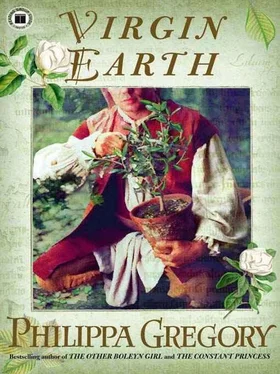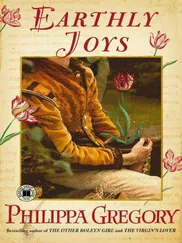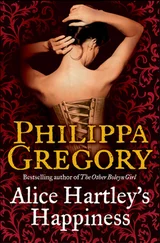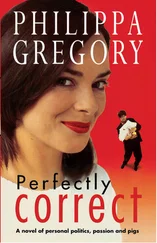If the new tenants of the house at Wimbledon have no objection, I should like you to collect from my garden any specimens which you would like to have as your own. I think the acacia tree was promised to you – all that long time ago. I particularly would like to see my own Violetten tulip again, I had one in particular which I thought might be so dark a purple as to be almost black.
If you can be admitted to the garden I would be very pleased to have some of my lily bulbs returned to me, especially those from my orange garden. I have high hopes of breeding a new variety of lily here and I will send you some bulbs in the spring. I shall call it the Lambert lily and my claim to fame shall not be for the battle for freedom but for one sweet-smelling, exquisitely shaped blossom.
Lady Lambert has joined me here with our children and the castle has become less like a prison and more like a home. All I am in need of, is tulips!
With best wishes to Mrs. Tradescant and Mrs. Norman -
John Lambert
John passed the letter to Hester without comment and she read it in silence.
“We’ll get him his Violetten back,” she said determinedly. “If I have to go over the Wimbledon garden wall at midnight.”
Elias Ashmole came to visit the Ark in midwinter, wearing a new fur-lined cape and very conscious of his new status. He came by carriage with some friends and brought a case of Canary wine to share with John. Hester lit the candles in the rarities room, and ordered dinner for them all, served it and ate her own dinner in the quieter company of Cook in the kitchen.
John put his head around the kitchen door. “We’re taking a stroll down to Lambeth,” he said. “For a glass of ale.”
Hester nodded. “I shall be in bed by the time you return,” she said. “If Mr. Ashmole wishes to stay the bed is made up in his usual room, and there are truckle beds for his friends.”
John came into the kitchen and gave her a kiss on the forehead. “I shall be late home,” he announced with satisfaction. “And no doubt drunk.”
“No doubt,” Hester said with a smile. “Good night, husband.”
They came home earlier than she expected. She was putting out the candles in the rarities room and raking out the fire when she heard the front door open and John stumble into the hall with Ashmole and his companions.
“Ah, Hester,” John said happily. “I am glad you are still awake. Elias and I have been doing some business and I need you to witness it for me.”
“Can it not wait until the morning?” Hester asked.
“Oh, sign it now and then we can put it away and have a glass of port,” John said. He spread the paper before her on the painter’s table in the window of the rarities room. “Sign here.”
Hester hesitated. “What is it?”
“It’s a piece of business and we need a witness,” Elias said smoothly. “But if you are uneasy, Mrs. Tradescant, we can leave it until the morning. If you want to read every paragraph and every sentence, we can leave it. We can find someone else to serve us if you are unwilling.”
“No, no,” Hester said politely. “Of course I can sign it now.” She took the pen and signed the paper. “And now I shall go to bed,” she said. “I give you good night, gentlemen.”
John nodded, he was opening a case of coins. “Here you are,” he said to Ashmole. “In good faith.”
Hester saw the antique milled shilling piece passed to Elias.
“Are you giving away one of our coins?” she queried in surprise.
Ashmole bowed and pocketed the coin. “I’m very grateful,” he said. He seemed far more sober than John. “I shall preserve it very carefully as a precious token and a pledge.”
Hester hesitated, as if she would ask him what pledge John had made to him; but one of the men opened the door for her and bowed low. Hester curtsied and went out and up the stairs to bed.
She was wakened by the bang of her bedroom door as John stumbled into the room and then by the shake of the bed as he dropped heavily onto it. She opened her eyes and saw that he had fallen asleep at once, on his back, still wearing his clothes. Hester thought for a moment that she could get up and undress him and get him comfortable in bed. But then she smiled and turned over. John’s drinking bouts were rare but she saw no reason why he should not wake up in the morning in some slight discomfort.
When he woke in the darkness he thought for a moment he had been dreaming his worst dream: of failure and his own inability to inherit his father’s work and continue his father’s name. He slipped out of the narrow bed without waking Hester, who turned and stretched her hand out over his pillow.
He slipped on his shoes and went downstairs. The parlor which had seemed so bright and jolly only hours ago was now dark and unwelcoming, it smelled of stale ale and tobacco smoke, and the fire was burned down to dark embers. He blew on the coals, was rewarded by a red glow, and then threw on a handful of kindling. The dry wood caught and the shadows leaped high in the room.
On the table was the document and at the foot of the document was his own clear signature, and next to it Elias Ashmole’s educated elliptical hand. He touched the wax of his seal. It was hard and cold, there was no escape. The signature was there, the seal was there, the document was there. It stated very clearly that at John Tradescant’s death Elias Ashmole was to inherit all the rarities in the collection and all the plants in the garden. John had signed away his patrimony, he had signed away his name, he had signed away his inheritance and all his own work and his father’s work would count for nothing.
“I didn’t mean this,” John whispered quietly.
With the deed of gift in his hand he went out into the hall. Hester in her white nightgown was like a ghost coming down the stairs.
“Are you ill?” she asked.
Dumbly, he shook his head. “I have done a most terrible, terrible thing.”
At once her eyes went to the contract in his hand which she had signed as he had bid her. “The business you were doing with Mr. Ashmole?”
“He told me it was a deed of gift, to give the rarities to the University of Oxford at our deaths. He told me that they would put our name to the collection and that everyone would always know that we had the first collection open to any visitor in all the world, that we had the finest things, the rarest, the most beautiful. He told me that I was signing the goods to him as a trustee. He would ensure that the university received the rarities entire, that they would call it the Tradescantean.”
There was the creak of a door opening upstairs.
“Come outside,” Hester whispered as if only in the garden could they be safe. She opened the door to the terrace and slipped out into the icy night, careless of her bare feet on the chill floorboards. “Does it not say that? The document? Is he not pledged to do that?”
“I just signed it,” John said numbly. “I just agreed with him that it would be a fine thing to have the collection in the care of the university. So I just signed it. And I made you sign it too.”
“And what does it say?”
“I didn’t read it carefully enough. And he is a lawyer. He has made sure that it is unclear. It says that the collection is to go to him entire; but there is nothing about the university. He is not a trustee, he will inherit everything for himself. He will have it when we die. He can keep it as he likes. Or he can give it to his heirs. My God, Hester, he can break it up and sell it piece by piece.”
She said nothing, she was aghast. Her face was as white as her nightcap, as her gown.
“And I signed too,” she said, her words a tiny thread of sound.
Читать дальше
Конец ознакомительного отрывка
Купить книгу












